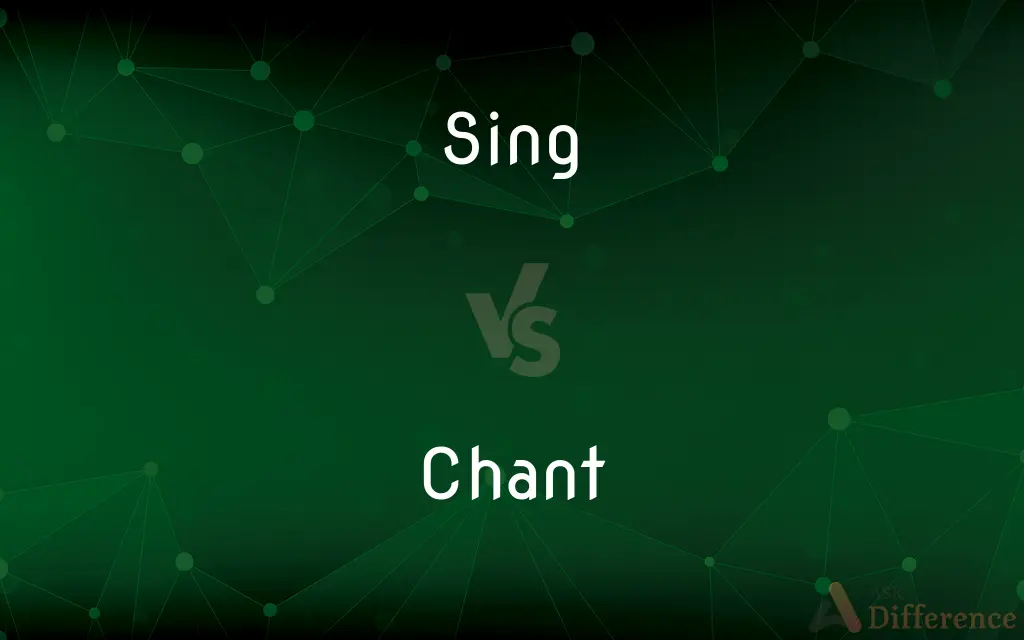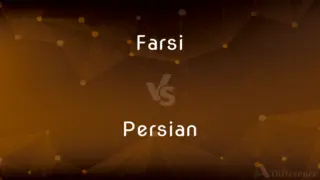Sing vs. Chant — What's the Difference?
By Tayyaba Rehman & Urooj Arif — Updated on April 19, 2024
Singing involves musical tones and melody to produce songs, emphasizing musicality and vocal technique, whereas chanting is repetitive, often monotone, and used in rituals or religious contexts.

Difference Between Sing and Chant
Table of Contents
ADVERTISEMENT
Key Differences
Singing is characterized by the use of pitch, rhythm, and a variety of vocal techniques to create music, often focusing on melodies and harmonies. Whereas, chanting typically involves the rhythmic speaking or singing of words or sounds, often on a single pitch or limited pitches, and is used for spiritual or ritualistic purposes.
Singers may perform a wide range of musical styles, from classical to pop, using their voice to convey emotion and narrative through song. On the other hand, chanters often repeat phrases or mantras, with the repetition serving to induce a meditative state or to express devotion.
Singing can be a solo performance or part of a group, with arrangements that can include complex harmonizations. Meanwhile, chanting is often a communal activity that emphasizes uniformity and collective participation over individual vocal prowess.
In terms of vocal technique, singing requires control over breath, pitch, and tone, and singers often train extensively to develop their vocal skills. Conversely, chanting may require less technical skill, focusing more on the delivery's rhythm and the meaning behind the words.
While singing is typically accompanied by instruments or orchestration to enhance the musical experience, chanting can be performed a cappella or with minimal instrumental accompaniment, relying on the power of the repeated phrase itself.
ADVERTISEMENT
Comparison Chart
Focus
Musicality, melody, and technique
Repetition, rhythm, and ritual
Context
Artistic, entertainment
Spiritual, religious
Vocal Technique
Diverse, complex
Monotone, simpler
Performance Style
Solo or ensemble, varied styles
Communal, uniform
Instrumental Use
Often accompanied
Minimal or none
Compare with Definitions
Sing
Vocal performance with melody and harmony.
She enjoyed singing in a jazz band where her vocal range could shine.
Chant
Repetitive vocalization of words or sounds.
The monks spent the morning chanting their sacred mantras.
Sing
Art of producing musical sounds with the voice.
His singing at the opera was met with tremendous applause.
Chant
Often features a monotone or limited pitch range.
His chanting maintained a steady, hypnotic tone throughout the ritual.
Sing
Expression through songs and lyrics.
Singing about her experiences, she connected deeply with her audience.
Chant
Less emphasis on musicality.
The chanting at the temple wasn’t musical but was powerful in its repetition.
Sing
Requires vocal technique and training.
She took singing lessons to improve her pitch and control.
Chant
Aims to promote meditation or spiritual experience.
Chanting the same phrase, the group entered a state of deep meditation.
Sing
Can be professional or recreational.
They went singing at the local karaoke bar for fun.
Chant
Used in religious or spiritual contexts.
Chanting is a significant part of their worship practices.
Sing
Make musical sounds with the voice, especially words with a set tune
Bella sang to the baby
Chant
A chant (from French chanter, from Latin cantare, "to sing") is the iterative speaking or singing of words or sounds, often primarily on one or two main pitches called reciting tones. Chants may range from a simple melody involving a limited set of notes to highly complex musical structures, often including a great deal of repetition of musical subphrases, such as Great Responsories and Offertories of Gregorian chant.
Sing
Make a high-pitched whistling or buzzing sound
The kettle was beginning to sing
Chant
A series of syllables or words that are sung on or intoned to the same note or a limited range of notes.
Sing
Act as an informer to the police
As soon as he got put under pressure, he sang like a canary
Chant
A canticle or prayer sung or intoned in this manner.
Sing
Recount or celebrate in poetry or other literature
Poetry should sing the variety of the human race
These poets sing of the American experience
Chant
A monotonous rhythmic call or shout, as of a slogan
The chant of the crowd at the rally.
Sing
An act or spell of singing
We asked him to come back and have a bit of a sing
A sponsored sing to pay for the theatre
Chant
To sing or intone to a chant
Chant a prayer.
Sing
To utter a series of words or sounds in musical tones.
Chant
To celebrate in song
Chanting a hero's deeds.
Sing
To vocalize songs or selections.
Chant
To say in the manner of a chant
Chanted defiant slogans.
Sing
To perform songs or selections as a trained or professional singer.
Chant
To sing, especially in the manner of a chant
Chanted while a friend jumped rope.
Sing
To produce sounds when played
Made the violin sing.
Chant
To speak monotonously.
Sing
To make melodious sounds
Birds singing outside the window.
Chant
To sing, especially without instruments, and as applied to monophonic and pre-modern music.
Sing
To give or have the effect of melody; lilt.
Chant
To sing or intone sacred text.
Sing
To make a high whining, humming, or whistling sound.
Chant
To utter or repeat in a strongly rhythmical manner, especially as a group.
The football fans chanted insults at the referee.
Sing
To be filled with a buzzing or ringing sound.
Chant
To sell horses fraudulently, exaggerating their merits.
Sing
To proclaim or extol something in verse.
Chant
Type of singing done generally without instruments and harmony.
Sing
To write poetry.
Chant
(music) A short and simple melody, divided into two parts by double bars, to which unmetrical psalms, etc., are sung or recited. It is the most ancient form of choral music.
Sing
(Slang) To give information or evidence against someone.
Chant
Twang; manner of speaking; a canting tone.
Sing
To produce the musical sound of
Sang a love song.
Chant
A repetitive song, typically an incantation or part of a ritual.
Sing
To utter with musical inflections
She sang the message.
Chant
To utter with a melodious voice; to sing.
The cheerful birds . . . do chant sweet music.
Sing
To bring to a specified state by singing
Sang the baby to sleep.
Chant
To celebrate in song.
The poets chant in the theaters.
Sing
To intone or chant (parts of the Mass, for example).
Chant
To sing or recite after the manner of a chant, or to a tune called a chant.
Sing
To proclaim or extol, especially in verse
Sang his praises.
Chant
To make melody with the voice; to sing.
Sing
A gathering of people for group singing.
Chant
To sing, as in reciting a chant.
Sing
(intransitive) To produce musical or harmonious sounds with one’s voice.
"I really want to sing in the school choir," said Vera.
Chant
Song; melody.
Sing
(intransitive) To perform a vocal part in a musical composition, regardless of technique.
Chant
A short and simple melody, divided into two parts by double bars, to which unmetrical psalms, etc., are sung or recited. It is the most ancient form of choral music.
Sing
(transitive) To express audibly by means of a harmonious vocalization.
Sing a lullaby
Chant
A psalm, etc., arranged for chanting.
Sing
(transitive) To soothe with singing.
To sing somebody to sleep
Chant
Twang; manner of speaking; a canting tone.
His strange face, his strange chant.
Sing
(ambitransitive) Of birds, to vocalise:
Chant
A repetitive song in which as many syllables as necessary are assigned to a single tone
Sing
(ornithology) To produce a 'song', for the purposes of defending a breeding territory or to attract a mate.
Chant
Recite with musical intonation; recite as a chant or a psalm;
The rabbi chanted a prayer
Sing
(literary) To produce any type of melodious vocalisation.
Chant
Utter monotonously and repetitively and rhythmically;
The students chanted the same slogan over and over again
Sing
To confess under interrogation.
Sing
(intransitive) To make a small, shrill sound.
The air sings in passing through a crevice.
A singing kettle
Sing
To relate in verse; to celebrate in poetry.
Sing
(intransitive) To display fine qualities; to stand out as excellent.
The sauce really makes this lamb sing.
Sing
(ergative) To be capable of being sung; to produce a certain effect by being sung.
Sing
(AU) In traditional Aboriginal culture, to direct a supernatural influence on (a person or thing), usually malign; to curse.
Sing
The act, or event, of singing songs.
I sometimes have a quick sing in the shower.
Sing
To utter sounds with musical inflections or melodious modulations of voice, as fancy may dictate, or according to the notes of a song or tune, or of a given part (as alto, tenor, etc.) in a chorus or concerted piece.
The noise of them that sing do I hear.
Sing
To utter sweet melodious sounds, as birds do.
On every bough the briddes heard I sing.
Singing birds, in silver cages hung.
Sing
To make a small, shrill sound; as, the air sings in passing through a crevice.
O'er his head the flying spearSang innocent, and spent its force in air.
Sing
To tell or relate something in numbers or verse; to celebrate something in poetry.
Bid her . . . singOf human hope by cross event destroyed.
Sing
To cry out; to complain.
They should sing if thet they were bent.
Sing
To utter with musical inflections or modulations of voice.
And they sing the song of Moses, the servant of God, and the song of the Lamb.
And in the darkness sing your carol of high praise.
Sing
To celebrate in song; to give praises to in verse; to relate or rehearse in numbers, verse, or poetry.
Arms and the man I sing.
The last, the happiest British king,Whom thou shalt paint or I shall sing.
Sing
To influence by singing; to lull by singing; as, to sing a child to sleep.
Sing
To accompany, or attend on, with singing.
I heard them singing home the bride.
Sing
Deliver by singing;
Sing Christmas carols
Sing
Produce tones with the voice;
She was singing while she was cooking
My brother sings very well
Sing
To make melodious sounds;
The nightingale was singing
Sing
Make a whining, ringing, or whistling sound;
The kettle was singing
The bullet sang past his ear
Sing
Divulge confidential information or secrets;
Be careful--his secretary talks
Common Curiosities
What is the main difference between singing and chanting?
Singing emphasizes melody and musicality, while chanting focuses on repetition and is often used in spiritual contexts.
Is singing more difficult than chanting?
Singing usually requires more technical skill and training, particularly in controlling pitch and timbre.
Can singing and chanting be part of the same performance?
Yes, some religious and cultural performances incorporate both singing and chanting.
What types of singing are there?
There are many types of singing, including opera, rock, pop, jazz, and folk, each with unique styles and techniques.
Do you need special training to chant?
Special training is not typically necessary for chanting, though some spiritual practices may require learning specific mantras.
How does chanting affect the mind?
Chanting is often used to induce a meditative state or trance, promoting relaxation and focus.
What is the social role of singing?
Singing plays a significant role in social bonding, cultural expression, and entertainment.
Is chanting always religious?
While commonly used in religious practices, chanting can also be secular, especially in protests or sports events.
Can chanting be musical?
Chanting can have musical elements, especially in rituals with a melodic focus, but it is generally more monotone than singing.
Are there health benefits to singing or chanting?
Both singing and chanting can have health benefits, including improved breathing, reduced stress, and increased sense of well-being.
Why do people sing?
People sing for artistic expression, entertainment, cultural tradition, and personal enjoyment.
What instruments typically accompany chanting?
Instruments like drums or bells may accompany chanting, especially in ritualistic contexts.
How is singing used in education?
Singing is used in education to enhance musical skills, cultural knowledge, and sometimes language learning.
How do you learn to sing properly?
Proper singing often requires lessons from a vocal coach to develop technique and protect the voice.
How do different cultures use chanting?
Different cultures use chanting in various ways, often in religious rituals, traditional ceremonies, and communal gatherings.
Share Your Discovery

Previous Comparison
Farsi vs. Persian
Next Comparison
Decoder vs. DemultiplexerAuthor Spotlight
Written by
Tayyaba RehmanTayyaba Rehman is a distinguished writer, currently serving as a primary contributor to askdifference.com. As a researcher in semantics and etymology, Tayyaba's passion for the complexity of languages and their distinctions has found a perfect home on the platform. Tayyaba delves into the intricacies of language, distinguishing between commonly confused words and phrases, thereby providing clarity for readers worldwide.
Co-written by
Urooj ArifUrooj is a skilled content writer at Ask Difference, known for her exceptional ability to simplify complex topics into engaging and informative content. With a passion for research and a flair for clear, concise writing, she consistently delivers articles that resonate with our diverse audience.
















































